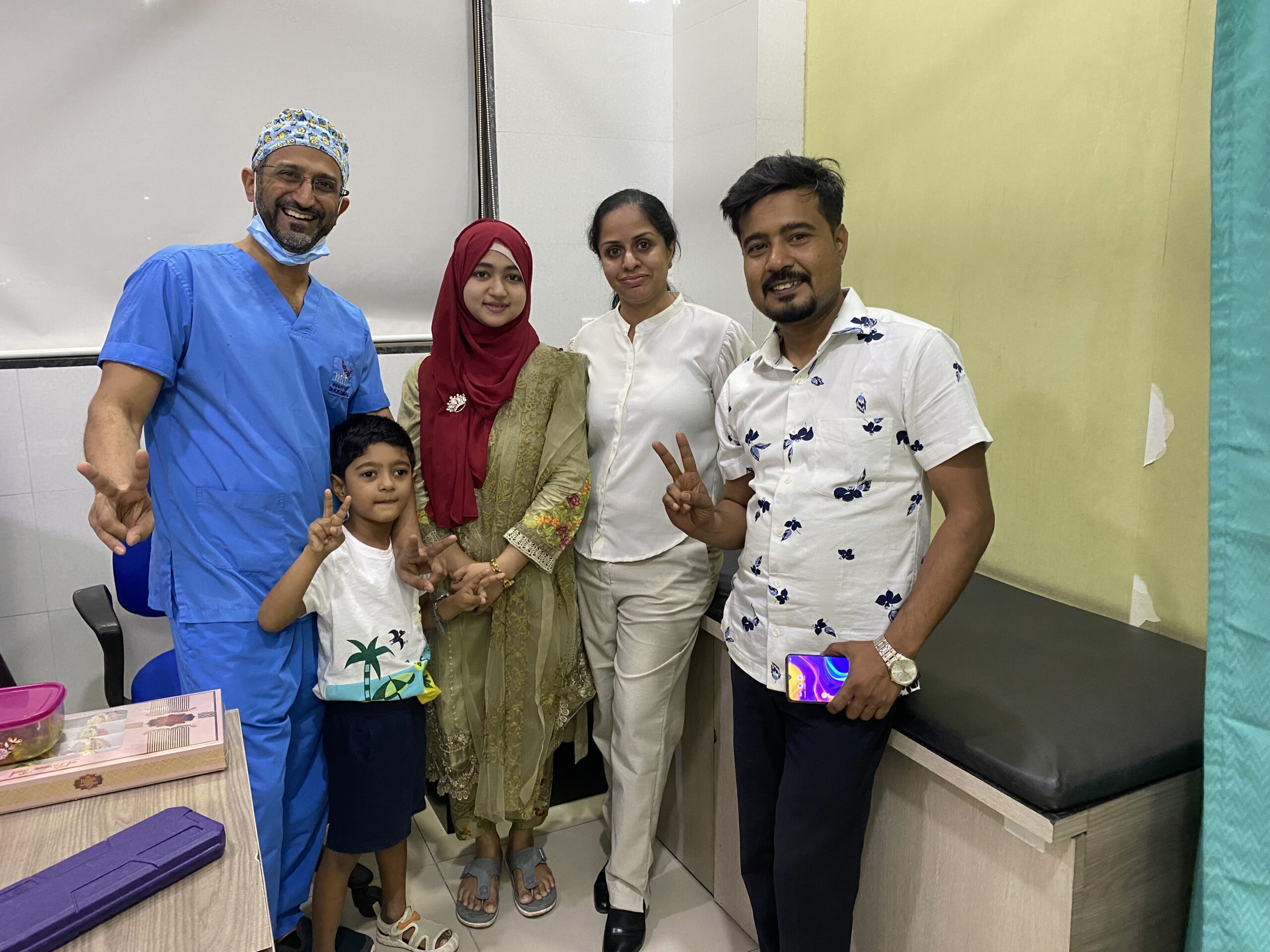Adult hypospadias surgery is fundamentally different from operating on a child. When we started hypospadias foundation in 2008, we started with an aim to help children with hypospadias and DSD get better outcomes. In 2015 we started getting lot of enquiries from adults with hypospadias. We realised that neither adult urologist or pediatric surgeons or plastic surgeons are equipped to deal with a congenital anomaly like hypospadias in adults. Whether it a primary non-operated hypospadias in an adult or a failed hypospadias repair in an adult, it is very different from the children. Hence, it is very important for the hypospadias surgeon to set the right expectation during the counselling session before hypospadias repair surgery. Unless the expectations are matched, no one is going to be happy after surgery.

Dr A.K.Singal and Dr Ashwitha Shenoy operating on a patient with hypospadias
What can adult hypospadias surgery accomplish:
1.Straight penis by chordee correction: If the person has a hypospadias with a bent penis, it can be fully corrected, and a straight penis can be achieved. We use a variety of chordee correction techniques like 16 dot plication Chordee correction surgery in an adult redo hypospadias using 16 dot plication in adults to achieve good outcomes.
2.Achieve urine opening at the tip: In almost all primary hypospadias, we are able to achieve an urinary opening on the tip of penis. In failed hypospadias or ones with previous surgeries (unless the glans -the head of penis- is damaged), with modern techniques, we are able to achieve opening on the tip. Rarely, if there is fibrosis or deformed glans due to previous surgery- we try to bring the opening as close to the head as possible.
3.Good Cosmetic result: In most of adult hypospadias, we are able to achieve a good cosmetic result with a straight penis, opening on the tip and a circumcised appearance. With modern stitches, good instruments and trained expert hypospadias surgeons, the stitch marks are also very less. Single stage hypospadias repair in an adult
4.Ease in intercourse: Some of the adults come to us with difficulty in intercourse due to chordee. Once chordee is corrected, the intercourse becomes painless and easy.
5.Standing up and passing urine: One of the chief complaints in hypospadias is that the urine goes backwards. Hence, the male has to sit to pass urine. This is especially true for proximal penile, penoscrotal or scrotal hypospadias. Once hypospadias is corrected, the urine goes forwards and the person can stand up and pass urine like a normal man. (urine stream pic)
6.Straight stream without spraying: Most of unoperated or failed hypospadias repair come to us with spraying of urine. This happens when the urine hole is not on the head, the urine doesn’t get a proper direction to form a nice stream. Once the hypospadias is corrected, urine starts coming in a normal single stream from the head of the penis and directed forwards without spraying.
7.Passage of urine from one hole: Some of the failed hypospadias cases may have multiple holes due to urethral fistulae. Due to these the person may be passing in 2, 3 or more streams. We have seen cases where the person was passing urine like a watering can due to multiple holes. This can all be corrected with successful adult hypospadias surgery by an expert surgeon.
8.Healthy mental state: We have seen lot of young adults, who feel inferior and incomplete due to a deformed penis because of hypospadias. They often are hesitant to establish relations with opposite gender. Once repaired with a good result, these men report higher mental self esteem and comfort in establishing healthy relationships. If the depression and anxiety is severe, it is a good idea to discuss with your surgeon and take some psychology help before and after surgery,
What adult hypospadias surgery cannot accomplish:
1.Increase in penis size: Hypospadias surgery leads to correction of anomaly but not an actual increase in size of penis. In some cases with severe chordee, unrepaired penis may look small due to chordee. Once we correct such cases, the penis may look longer due to straightening of the penis.
2.Solve premature ejaculation: Premature ejaculation is not related to the hypospadias and hence surgery can’t solve this. For such issues we refer the cases to adult urologist for treatment.
3.Erectile dysfunction: Some men with hypospadias come with erectile dysfunction, generally this is not related to hypospadias itself. It may be psychological or due to some other anomaly. Hypospadias by itself doesn’t cause erectile dysfunction and repairing hypospadias doesn’t improve it either. For such issues we refer the cases to adult urologist for treatment.
4.Cure infertility: Hypospadias may cause difficulty in intercourse if there is severe chordee but generally doesn’t cause infertility. Hence, if the sperm count is low or poor, doing a surgery will not solve this. For such issues we refer the cases to adult urologist for treatment.
It is important that adults with hypospadias discuss these issues threadbare with their treating hypospadias surgeon before surgery. We also take help of a clinical psychologist or an adult urologist whenever needed before surgery to set the right expectations. At Hypospadias Foundation India, we are dedicated to helping adults and children with hypospadias get the right diagnosis, full counselling, expectation setting and surgical treatment with empathy. With both the surgeon and the patient aligned, great outcomes and happiness can be achieved.
Dr A.K. Singal is rated as the best hypospadias surgeon in the world for adult hypospadias surgery. Dr Ashwitha Shenoy is a well-trained pediatric urologist and hypospadias surgeon working with Dr Singal. Together as a team both of them treat hundreds of adults and children with hypospadias from across India and the world every year with best care and results. With advancing experiences, the complications of adult hypospadias have decreased significantly, and success rates are above 96% at Hypospadias Foundation.
Contact Form for Hypospadias Foundation
Please fill all clinical details and upload pictures and clinical summaries (if available)

